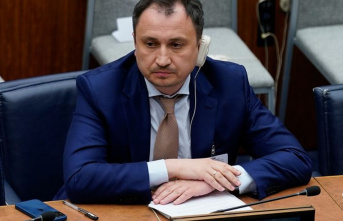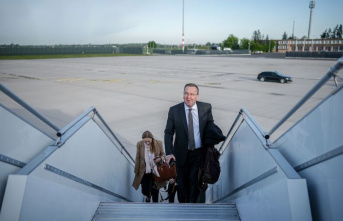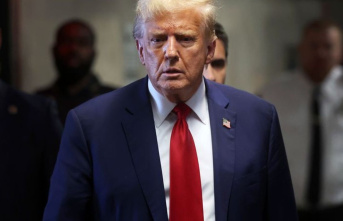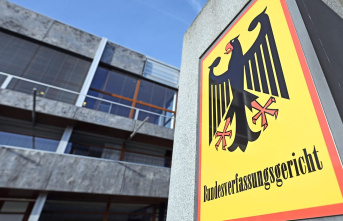at the beginning of the week the head of the US military command for Africa (Africom), Stephen Townsend, via Twitter appeared in Public: Russian military aircraft had flown from Russia to Libya and had made a stop in Syria. The machine had been painted over, "in order to disguise their Russian origin," reported the U.S. military. Russia attempts clearly to pass on in Libya, the scales in its favor, the commander. For too long, Russia will have the full extent of his involvement in the ongoing Libya conflict, disputed ends. But now there is "no Denying it any more".
Russia has rejected the representation. "These are false news," said the Vice-Chairman of the defense Committee of the state Duma, Andrei Krassow, the Russian news Agency Interfax according to. "This is just another one of those American horror stories."
stations of a relationshipit is True, however, that the relations between Russia and Libya date back to no later than the end of the Second world war. At the time, Josef Stalin tried at the conference of Potsdam in vain, a Russian mandate on the Libyan province of Tripolitania to negotiate. After the coup of 1969, the Moscow-backed then Muammar Gaddafi with massive military aid.
In the year 2000, the relations in the context of Putin's choice as Russia's President, although a new impetus. Pass out Putin saw, however, how Nato has been to limit the Russian influence in 2011, with their use in the uprising against the autocrat Gaddafi again.
As the Libyan army officer Khalifa Haftar in 2014 took over the military command of the troops of the Libyan government-in-exile in Tobruk, Moscow saw in him a suitable Partner, its interests in Libya to exercise. In return for military support, he offered the Russians access to the Libyan energy market and the use of the Mediterranean ports of Tobruk and Darnah.
First of all, Russia did not join in with active support. But from 2017, it cared for wounded fighters from Haftars army. In the year 2018, according to the Think-Tank "The Washington Institute", sent to Russia the forces of private military companies in Libya.
Egypt's interestsThus, the war got a new Dimension. The military strengthened Haftar is regarded as a fierce opponent of any form of political Islam. So he was also the Partner of choice for the Egyptian government of Abdel Fatah al-Sisi. Which had led in 2013 to the successful military coup against President Mohammed Morsi, from the ranks of the Muslim brotherhood and fears that the movement could gain a new impetus, and it was on the neighboring Libya.
Together with the United Arab Emirates, in the fight against the regional influence of the Muslim brotherhood, represents Al-Sisi decided against by many countries recognised government of Prime Fajis al-Sarradsch that there is only a small part of the country and in Parliament on the votes of Islamist groups is dependent.
rivalry with AnkaraAccording to annoyed the Egyptian government for some time about the Turkey, Al-Sarradschs troops military support, among other things, with mercenaries from Syria. In January of Cairo, said that the Turkish involvement in Libya had a direct impact on the national security of Egypt. Egyptian media confirmed that the government of Erdogan to back this up, "neo-Ottoman" ambitions .
The Turkey, in turn, it is not only to Libya itself, but also to a share in the gas fields in the Mediterranean sea, which previously had to be managed by Greece, Cyprus, Israel and Egypt. Libya, too, has a claim to a portion of the gas, to gain Ankara, apparently, with Al-Sarradschs help access.
This are Russia and Turkey, not only in Syria against the players, but also in Libya. A direct confrontation of both powers from soft yet.
Hybrid strategyso Far, Russia continues in Libya and an indirect military presence by private military companies (Private Military Companies, PMC): "The tendency to rely more and more on PMCs as a foreign policy Instrument, is a basic feature of Putin's strategy in many areas", - said in an analysis of the "Washington Institute". Also, the Repainting of Russian military aircraft in Syria would fit in this picture.
A complex mixture of sub-contractors, it is called the "Washington Institute", make it difficult to identify the responsibilities of the deployed forces is clear. The private forces to protect to include sharp as well as technicians, are specialized in the use of drones. Thus, it was possible in the past few months, an American and an Italian drone to shoot down. This requires a technical Know-how, on the Haftars military do not have.
The hybrid war strategy, according to the "Washington Institute" for Russia several advantages: for example, could present the country officially as a mediator, without military lift Engagement level. At the same time, it could cause the conflict to escalate as long as on a low flame, until in the course of negotiations, finally, a welcome agreement.
Other powers, have power because of the lack of military involvement less negotiation than Russia. In addition, Moscow could secure in addition to Parts of the energy business is also in control of the Libyan refugee corridor. Thus, Russia would have a very strong migration political lever against Europe in the Hand.
Russian denialThe accusation that Russia has set in Libya, private military company, not only the USA but also the UK. A UN report, Russia dismissed as "fabricated" back, also comes to this conclusion. The truth is, however, a also: Similar allegations against other actors such as the United Arab Emirates and Turkey. The arms embargo is more than fragile, and the complexity of the conflict continues to increase.
author: Kersten Knipp
*The post "Russia's covert proxy war in Libya" is published by Deutsche Welle. Contact with the executives here.
Deutsche Welle Date Of Update: 28 May 2020, 06:27










